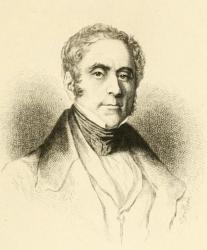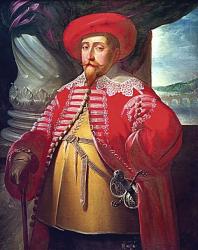Go Ad-Free
If you regularly use Hymnary.org, you might benefit from eliminating ads. Consider buying a subscription.
If you regularly use Hymnary.org, you might benefit from eliminating ads. Consider buying a subscription.
1 Verzage nicht, o Häuflein klein,
obschon die Feinde Willens sin't,
dich gänzlich zu verstören
und suchen deinen Untergang,
davor dir recht wird angst und bang;
es wird nicht lange währen.
2 Dich tröste nur, daß deine Sach
ist Gottes, dem besiehl die Nach,
laß ihn allein walten.
Er wird durch seinen Gideon,
den er wohl kennt, der helfen schon,
dich und sein Wort erhalten.
3 So wahr Gott Gott ist und sein Wort,
muß Teufel, Welt und Höllenpfort
und was dem thut anhangen,
endlich werden zu Hohn und Spott.
Gott ist mit uns und wir mit Gott,–
wir werden Sieg erlangen!
Source: Evang.-Lutherisches Gesangbuch #249
 Altenburg, Johann Michael, b. at Alach, near Erfurt, on Trinity Sunday, 1584. After completing his studies he was for some time teacher and precentor in Erfurt. In 1608 he was appointed pastor of Ilversgehofen and Marbach near Erfurt; in 1611, of Troch-telborn; and in 1621 of Gross-Sommern or Som-merda near Erfurt. In the troublous war times he was forced, in 1631, to flee to Erfurt, and there, on the news of the victory of Leipzig, Sept. 17, 1631, he composed his best known hymn. He remained in Erfurt without a charge till, in 1637, he was appointed diaconus of the Augustino Church, and, in 1638, pastor of St. Andrew's Church. He d. at Erfurt February 12, 1640 (Koch, iii. 115-117 ; Allg. Deutsche Biog., i. p. 363, and x. p. 766—the latte… Go to person page >
Altenburg, Johann Michael, b. at Alach, near Erfurt, on Trinity Sunday, 1584. After completing his studies he was for some time teacher and precentor in Erfurt. In 1608 he was appointed pastor of Ilversgehofen and Marbach near Erfurt; in 1611, of Troch-telborn; and in 1621 of Gross-Sommern or Som-merda near Erfurt. In the troublous war times he was forced, in 1631, to flee to Erfurt, and there, on the news of the victory of Leipzig, Sept. 17, 1631, he composed his best known hymn. He remained in Erfurt without a charge till, in 1637, he was appointed diaconus of the Augustino Church, and, in 1638, pastor of St. Andrew's Church. He d. at Erfurt February 12, 1640 (Koch, iii. 115-117 ; Allg. Deutsche Biog., i. p. 363, and x. p. 766—the latte… Go to person page > (no biographical information available about Gustav II Adolf, King of Sweden.) Go to person page >
(no biographical information available about Gustav II Adolf, King of Sweden.) Go to person page >| First Line: | Verzage nicht, o Häuflein klein |
| Author (attributed to): | Michael Altenburg |
| Author (attributed to): | Gustav II Adolf, King of Sweden |
| Language: | German |
| Notes: | Polish translation: See "Gromadko mała Bożych sług"; Spanish translation: See "No temas tú, pequeña grey" by Marta Weihmüller and J. R. de Balloch |
| Copyright: | Public Domain |
Suggested tune: KOMMT HER ZU MIR
Verzage nicht du Häuflein klein. [In Trouble.] Concerning the authorship of this hymn there are three main theories—i. that it is by Gustavus Adolphus; ii. that the ideas are his and the diction that of his chaplain, Dr. Jacob Fabricius; and iii. that it is by Altenburg.
This hymn has ever been a favourite in Germany, was sung in the house of P. J. Spener every Sunday afternoon, and of late years has been greatly used at meetings of the Gustavus Adolphus Union—-an association for the help of Protestant Churches in Roman Catholic countries. In translations it has passed into many English and American collections.
Translations in common use:—
1. Fear not, 0 little flock, the foe. A good translation from the text of 1638, omitting stanza iv., by Miss Winkworth, in her Lyra Germanica, 1855, p. 17. Included, in England in Kennedy, 1863, Snepp's Songs of Grace & Glory, 1871, Free Church Hymn Book, 1882, and others; and in America in the Sabbath Hymn Book, 1858, Pennsylvania Lutheran Church Book, 1868, Hymns of the Church, 1869, Baptist Hymn Book, 1871, Hymns and Songs of Praise, 1874, and many others.
2. Be not dismay'd, thou little flock. A good translation of stanzas i.-iii. of the 1638 text in Mrs. Charles's V. of Christian Life in Song , 1858, p. 248. She translated from the Swedish, which, in the Swensha Psalmsboken, Carlstadt, N.D. (1866), is given as No. 378, "Förfaras ej, du lilla hop!" and marked Gustaf H. Adolf. Her version is No. 204 in Wilson's Service of Praise, 1865.
3. Thou little flock, be not afraid. A translation of stanzas i.-iii. from the 1638 text, by M. Loy, in the Ohio Lutheran Hymnal, 1880, No. 197.
Other translations are all from the text of 1638.
(1.) "Be not dishearten'd, little flock," by Dr. H. Mills, 1856, p. 121. (2.) "Despond not, little band, although," by Dr. G. Walker, 1860, p. 41. (3.) "Be not dismay'd, thou little flock, Nor," by E. Massie, 1866, p. 143. (4.) "0 little flock, be not afraid," in J. D. Burns's Memoir and Remains, 1869. p. 226. [Rev. James Mearns, M. A..]
-- Excerpts from John Julian, Dictionary of Hymnology (1907)


 My Starred Hymns
My Starred Hymns